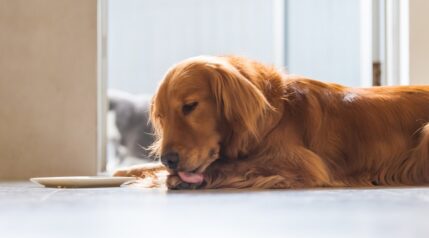No matter how much we love our canine friends, we can’t deny their obvious odor from time to time. While some smells have a quick fix, there are times where a smell can point to a more serious issue. Some dogs just carry a “dog” smell with them and will require more thorough grooming.
Other dogs will need far more attention, as having a smelly dog can be due to a health-related problem. If not treated, you could be looking at larger vet bills or, worse – putting your dog’s health at risk. Sometimes dogs smell just because their owners aren’t grooming them enough.
While there are multiple reasons your pup may suffer from smelly dog syndrome, some are more common than others. In this article, we will discuss all the possible smells coming from your furry BFF and ways you can address it.
Is a Smelly Dog Normal?
As humans, we are used to being well-bathed and fresh each day. It’s no wonder why the pungent smells that our pets produce can be so overwhelming. Dogs are different in this sense as they don’t often receive frequent showers, so should we expect each dog to noticeably stink?
The short answer to this question is no. A dog should never have a noticeable smell upon entering a room or one that often catches your attention. If this is the case with your pup, then there is a chance that they are experiencing a medical issue that is leading to a distinct smell. If your pup has an odor that is not resolved with their usual bath routine, then it’s time to consider the factors below.
Ear Infections

Does your dog have an odd, yeasty smell? Do they often shake their head, paw at their ears, or seem uncomfortable when their ears are touched? If you answered yes to any of the questions above, then your dog may be experiencing odor from yeast or bacteria in the ears.
The ear is the perfect environment for yeast and bacteria to brew. A healthy ear in a dog has defenses ready to fight off unwanted organisms and helps to maintain a healthy environment in the ear itself.
Organisms like yeast and bacteria crave dark and enclosed parts of the body like the ears, so if the pup’s defenses are lacking for any reason, this makes for a perfect environment for unwanted ear infections. Some factors that affect a healthy environment in the ear include:
- Allergies
- Hormonal imbalances
- Excess hair in the ears
- Long, floppy ears
- Frequent swimming
If you think an ear infection may cause your dog’s odd smell, contact your veterinarian for a routine ear swab test. They can easily swab the content in your pup’s ear and look for the presence of bacteria and yeast under a microscope. If any of these are found, you will often be sent home with a solution to clean your pet’s ears and antibiotics for the bacteria that is present.
Dental Disease

Just like in humans, the build-up of tartar and plaque on a dog’s teeth can lead to an unpleasant odor. Whether it’s because of genetics, diet, or lack of proper dental cleaning, tartar can build up quickly on your dog’s teeth over the years. Aside from the foul smell that dental disease can cause, is the pain that your pup can experience with its presence as well. Some signs of dental disease in dogs are:
- Bad breath
- Discoloration of teeth
- Bleeding or red gums
- Blood on chew toys or in the water bowl
- Problems eating or picking up food
- Loose teeth
- Not wanting their mouth or head touched
- Facial swelling in advanced stages of dental disease
To prevent odor from dental disease, it’s best to discuss a dental cleaning schedule with your veterinarian. You can also have your pup eat dog food made to remedy bad breath. Each pet will have their own specific needs, but ideally, one dental cleaning a year is ideal for optimum dental health for your canine friend. You can also discuss which food is best for your dog’s teeth in order to promote dental health.
Skin Conditions

The skin covers the entire body, so you can imagine how a skin condition can have a huge impact on your pup’s scent. Just like in humans, there is a long list of skin conditions that can affect the dog’s appearance, health, and smell. Regular brushing can help dandruff, but you’ll want to use a deshedding tool like the furminator in order to keep dead skin cells from irritating healthy skin.
In all of these conditions, the most common symptoms of itching and irritation can lead to self-mutilation. Since pups are prone to chewing and scratching their skin regardless of the pain associated, this often results in wounds and open sores on the skin. Wounds and skin irritation are known to cause a pungent smell on a dog’s skin. Some skin conditions that can cause an abnormal odor include:
- Hot spots (moist sores on the skin resulting from self-mutilation)
- Dandruff (dry and flakey skin)
- Flea dermatitis (irritation due to the presence of fleas)
- Yeast on the skin
- Skin mites (skin mites that cause skin irritation)
- Skin allergies (causing itching and skin irritation)
- Chronic skin conditions requiring a professional diagnosis
If you fear that your pet is suffering from mild skin itching and allergies, you can refer to our article with suggestions for shampoo for itchy skin. While these are great tools, we recommend you consult your veterinarian before starting any at-home treatments. Your vet may also recommend oatmeal shampoos to help soothe irritated dog skin.
Anal Glands

You may be unaware of the infamous scent glands that hide in the muscles on a dog’s behind. When working correctly, they are naturally expressed with each bowel movement, which helps to mark their scent for other dogs that cross their stools path. This is also the reason why dogs smell each other’s back end upon meeting.
When anal glands get “backed up,” this can result in a foul odor that is excreted on your pets behind or, even worse, throughout your house. You cannot miss the scent of anal glands when present, as it is known for its strong “fishy” smell. An obstructed anal gland can also cause discomfort your pain and can result in an abscess if not drained properly. In small dogs, especially, anal glands may need to be manually expressed when they are not functioning properly to eliminate discomfort and leaking of their contents. Some signs of impacted anal glands include:
- Scooting on their behind
- Licking their back end
- Discomfort when passing stool
- Blood in stool or spots around your house where your pet frequently sits
If you fear an anal gland issue is the cause of your dog’s stinkiness, it’s best to contact your vet to have your pet’s anal glands checked. Upon physical exam, they can manually check the size of your pet’s anal sacs and empty them if necessary. In this visit, you can decide how frequently your pet should be seen for anal gland expressions as well.
Gas Due to Indigestion

Gas or gastrointestinal upset can be another reason behind a smelly dog. The occasional flatulence is normal, but if it seems like your pet is always gassy or their gas has an extremely potent smell, that may be signs of a bigger problem. Your pet’s gut has a sensitive system in place, so any disturbance in that balance can result in an upset stomach. Some things that can cause increased flatulence include:
- Change in diet
- Improper diet
- Eating new foods like pineapple
- Eating trash or something they shouldn’t have
- Bacterial imbalance
- Intestinal Parasites
- Any other condition affecting the gastrointestinal system
If you believe your pet has an abnormal amount of gas, we recommend speaking to your vet to see if there are any changes you can make in your pet’s diet or if any diagnostics are necessary.
Got Into Something Smelly

We often forget that our dogs come with a set of hardwired instincts that are passed down from their wild ancestors. One of the not so favored instincts that have been passed down is their need to roll around in smelly things. Whether it’s dog poop, dead wildlife, or smelly trash… your dog may feel the urge to jump right in.
Many believe that this relates back to their need to mask their smell in order to sneak up on their prey. Dogs in the wild have been known to roll around in any pungent-smelling objects in their path in an effort to mask their scent for their hunt. Your pup may tap into this instinct when they cross exceptionally smelly objects!
Wet Dog Smell

Does your dog have a potent smell when he gets wet? This is actually entirely normal. This relates back to the bacteria and yeast that live on a dog’s skin. When these bacterias and yeasts come in contact with water, they release that characteristic “wet dog smell.” As long as this smell disappears once your dog is dry, this is nothing to worry about!
Serious Medical Conditions
Among the reasons for a foul smell in dogs are the more serious medical conditions that have been known to create a smelly pup. While these are the rare reasons behind a potent smell, they are still worth considering. Some of these conditions include:
Kidney disease: Kidney disease in dogs can lead to foul breath, which is caused by ulcers that can form in the mouth due to this disease.
Diabetes: Some dogs with more serious conditions resulting from diabetes have been known to have strong ammonia, sweet, or fruity smell coming from the mouth.
Masses: If you have a lumpy and bumpy dog, certain masses can result in foul smells if they progress without medical intervention.
Autoimmune skin conditions: Some autoimmune conditions of the skin can cause sores on the skin, which can lead to abnormal smells coming from the skin.
Eye conditions: Several conditions of the eye can result in discharge, swelling, or pain in pups. When these conditions are left unaddressed, it can result in an unpleasant odor.
Again, these are some of the more uncommon reasons behind a stinky dog. It is more likely that your pup’s odor is caused by one of the many reasons listed above in this article.
When To See A Vet
If your pet is putting off an unpleasant odor that does not seem to be relieved from a bath, then it is always recommended to pay your veterinarian a visit. Most conditions that result in a smelly dog are mild and fairly easy to treat and manage. The faster you address your stinky dog, the easier the problem will be to fix!
Final Thoughts
There are many reasons behind a dog’s unknown odor, all of which should be addressed when noticed. Some key points to remember when it comes to keeping your dog smell free are:
- Keep up with your dogs’ dental health
- Make sure to check their ears monthly for any smells, inflammation, or redness
- Alert your vet to any skin changes
- Have your pet’s anal glands checked according to your vets recommended schedule
- Have your pet seen for regular physical exams
- Remember to bathe your dog regularly (once a month or when in contact with smelly objects)
While this is a lot of information to digest, you can often find why your dog smells just by the process of elimination. If you follow these recommendations for your furry friend, you can take advantage of all the stink-free cuddles that your pup has to offer!





